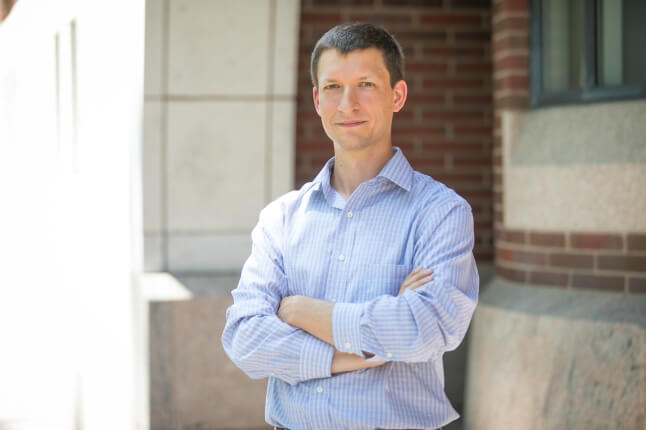News
Six SEAS students have been recognized with Dean’s Award for Outstanding Engineering Projects (Eliza Grinnell/SEAS)
Six students from the Harvard John A. Paulson School of Engineering and Applied Sciences (SEAS) were recognized with the Dean’s Award for Outstanding Engineering Projects at the recent SEAS Design and Project Fair at the Science and Engineering Complex. Recipients participated in ES100, a year-long capstone course for seniors in the SB engineering program, where each student develops a project to address a real-world engineering problem. The award comes with a prize of $500.
“SEAS students make things that may be really cool, quirky, or fun,” said SEAS Dean David Parkes. “And just as often, their work will help solve a real-world problem and have a significant impact on people’s lives. During ES100, a year-long capstone course for seniors in the SB engineering program, students tackle specific problems. They develop technical specs, design solutions, test their ideas using quantitative analysis and simulations, prototype, and build.”
For the 2023-24 academic year, 42 students completed ES100 projects. Five projects, including one two-student team project, were selected for the award. The award-winning projects covered a broad range of topics, including a remote sensor network for detecting earthquake victims trapped under rubble, an image-to-text application for the visually impaired, a quadcopter drone with enhanced maneuverability, and tool for determining potential water contaminants and suggested filtration solutions in wells.
Serena Zhao’s bioengineering capstone, “Developing Uniform, Photon-Emitting Nanoprobes for Multi-Color Electron Microscopy,” designed nanoprobes that emit colored light when hit by protons from an electron microscope, allowing for much more detailed imaging at the nanoscale level.
“Electron microscopy (EM) images are black and white,” Zhao said. “There’s no specificity, no color labeling. When it comes to studying complex biological processes, that’s a huge disadvantage. My project was trying to build these nanoprobes that emit color under EM, so we can get an electron image, a colored probe image, and then we can overlay them into a colored, labeled image that still has specificity and high resolution.”
The other four award winners were:
- Arba Shkreli and Molly Bosworth, electrical engineering, for their project, “SeASAR: Sensor Application for Search & Rescue in Urban Settings”
- Yasmine Omri, electrical engineering, for her project, “Towards a Real-Time Image-to-Speech Tool for the Visually Impaired: Efficient Hardware for On-device Image Classification”
- Lachlan McGranahan, mechanical engineering, for his project, “Modeling, Simulation, and Control for a Tilt-Rotor Quadcopter”
- Layla Seaver, environmental science and engineering, for her project, “Addressing Forever Chemicals: An Algorithm for PFAS Prediction Modeling and Filter Selection for Private Well-Users”
“I’m interested in using my engineering background to serve actual human needs,” Omri said. “My project falls into a field that we call ‘tiny machine learning.’ I wanted to find a way to run a very complex system locally, with energy efficiency and performance speed. I tried to consolidate it into a practical, application-based system focused specifically on the visually impaired.”
Four SEAS students received Honorable Mention for their senior capstone projects (Eliza Grinnell/SEAS)
Four additional SEAS students received Honorable Mentions for their capstone projects. They are:
- Cherish Jongwe, bioengineering, for his project, “Biofilm-Enhanced Household Water Filtration System for Heavy Metals Removal”
- Nicholas Laws, mechanical engineering, for his project, “Visualization Tool for Chemical Kinetic Pathways in Plasma-Assisted Combustion”
- Anna Ramos, electrical engineering, for her project, “Eye Controls for Quadriplegic Gamers”
- Emma Zuckerman, mechanical engineering, for her project, “Low Reynolds Number Anemometer for Earth’s Stratosphere and the Martian Atmosphere”
Seaver also received a $500 award from the Society of American Military Engineers. A former project lead and co-president of the Harvard chapter of Engineers Without Borders, Seaver has devoted most of her Harvard career to water research and infrastructure development.
“I took Elsie Sunderland’s class on toxicology, which introduced the idea of forever chemicals and contaminants like PFAS,” Seaver said. “When it came time to choose a thesis topic, I thought about the importance of these emerging contaminants for water quality and public health, and how I had the opportunity to work with one of the leading experts in this field through Elsie’s lab. If I could create a tool to make that information from the lab more readily available to users, that’d be the best way I could have an impact with my thesis.”
After she graduates, she’ll be working on water projects at the Boston office of Kleinfelder, an engineering firm.
“One of their most recent developments is looking at PFAS removal technology at the municipal level, which I’m really excited about,” she said.
Topics: Academics, Dean, Awards, Bioengineering, Electrical Engineering, Environmental Science & Engineering, Materials Science & Mechanical Engineering
Cutting-edge science delivered direct to your inbox.
Join the Harvard SEAS mailing list.
Press Contact
Matt Goisman | mgoisman@g.harvard.edu




